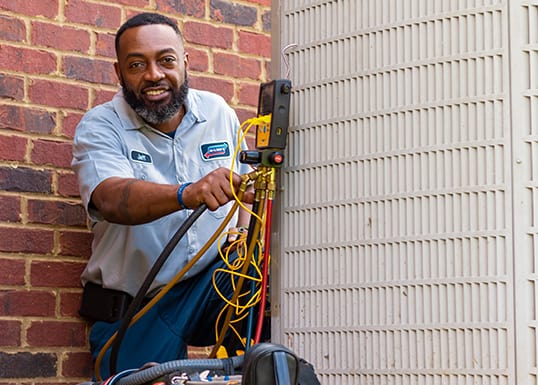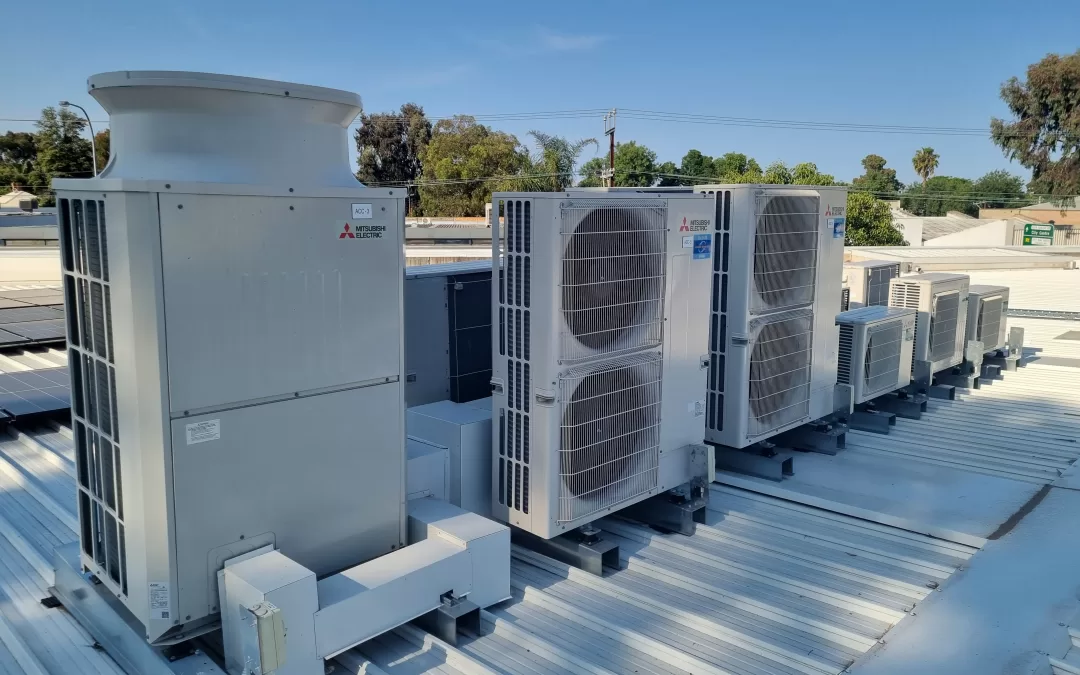Learn why HVAC experts are critical for sustained system performance
Wiki Article
Discovering the Necessary Parts of an Efficient Cooling And Heating System
An efficient cooling and heating system is built on several critical components that operate in consistency. Each part, from the thermostat to the ductwork, plays a necessary duty in keeping convenience and energy effectiveness. Understanding these aspects is critical for maximizing efficiency and boosting indoor air high quality. As one examines these parts, the detailed connections in between them expose understandings into improving total system performance. What details variables contribute most to this efficiency?The Function of the Thermostat in HVAC Efficiency

Although commonly overlooked, the thermostat plays a critical duty in the performance of heating and cooling systems. HVAC experts. This tiny device acts as the primary nerve center, managing temperature setups and making sure optimal comfort within a space. By accurately picking up the ambient temperature level, the thermostat interacts with the air, ventilation, and heating conditioning units to preserve the wanted environment
An efficient thermostat lessens energy intake by triggering the cooling and heating system just when essential, therefore protecting against too much home heating or air conditioning. Modern smart and programmable thermostats boost this efficiency additionally by allowing customers to set timetables and from another location readjust settings, adjusting to everyday regimens.
The positioning of the thermostat is important; incorrect place can lead to imprecise temperature readings, resulting in inefficient operation. Generally, a well-functioning thermostat not only boosts convenience yet also adds noticeably to energy cost savings and the durability of the heating and cooling system.
Comprehending the Relevance of Air Filters
Air filters serve a necessary feature in HVAC systems by guaranteeing that the air circulating within a room continues to be clean and healthy. These filters trap dust, irritants, and various other pollutants, preventing them from being recirculated throughout the environment. By capturing these bits, air filters add to improved interior air high quality, which can greatly profit owners' wellness, particularly those with allergies or respiratory problems.In addition, maintaining clean air filters boosts the performance of a/c systems. Clogged filters can restrict airflow, causing the system to function more challenging to preserve desired temperature levels, resulting in raised energy usage and greater utility bills. Routinely changing or cleaning filters is an important upkeep step that can extend the life expectancy of HVAC devices. Ultimately, understanding the significance of air filters allows home owners and structure supervisors to take aggressive procedures to ensure a well-functioning, reliable HVAC system that advertises a comfortable and secure interior environment.

The Capability of the Heating System and Heatpump
Furnaces and heatpump are essential elements of heating and cooling systems, liable for supplying heat during chillier months. Furnaces run by heating air through burning or electric resistance, after that distributing it throughout the home using ducts. They typically use quick heating and can be fueled by gas, electricity, or oil, depending on the system type.Alternatively, warm pumps move warm as opposed to produce it. They remove warmth from the outside air or ground, also in low temperature levels, and move it indoors. HVAC experts. This dual performance permits heatpump to additionally supply cooling in warmer months, making them flexible options for year-round climate control
Both systems require appropriate maintenance to ensure performance and durability. While furnaces succeed in extreme chilly, heatpump can be advantageous in modest climates. Comprehending their distinctive functionalities help property owners in picking one of the most suitable choice for their heating needs.
Checking Out the Cooling System
The cooling device is an important element of HVAC systems, readily available in numerous kinds to match various requirements. Recognizing the performance ratings of these systems is necessary for making educated selections concerning power consumption and cost. This section will check out the varied kinds of ac unit and make clear just how efficiency ratings impact efficiency.Kinds Of Air Conditioners
While numerous factors affect the selection of cooling systems, comprehending the various types available is vital for property owners and building managers alike. Central air conditioning conditioners are developed to cool entire homes or structures, using a network of ducts for airflow. Window systems use an even more localized service, ideal for little rooms or solitary areas. Mobile a/c unit supply adaptability, permitting individuals to move the unit as needed. Ductless mini-split systems are another alternative, integrating the efficiency of main systems with the comfort of zoning, as they need no ductwork. Geothermal systems harness the HVAC experts planet's temperature for energy-efficient air conditioning. Each kind comes with distinctive advantages, making educated options necessary for effective environment control.
Performance Scores Described
Understanding efficiency ratings is vital for selecting the right cooling system, as these metrics provide insight right into the system's efficiency and power usage. The most typical rating for air conditioning system is the Seasonal Energy Efficiency Ratio (SEER), which determines the cooling output throughout a typical air conditioning period divided by the complete electric energy input. A higher SEER shows better performance. Additionally, the Energy Efficiency Ratio (EER) is made use of for determining performance under particular conditions. One more vital metric is the Energy Celebrity qualification, which signifies that an unit satisfies rigorous energy performance guidelines. By examining these rankings, consumers can make informed selections that not just optimize comfort yet also decrease power prices and ecological influence.The Importance of Ductwork and Air flow
Efficient ductwork style and air movement administration play critical functions in the overall effectiveness and performance of heating and cooling systems. Correct ductwork warranties that conditioned air is distributed evenly throughout an area, decreasing temperature level fluctuations and enhancing comfort. Properly designed ducts decrease resistance to airflow, decreasing the workload on a/c tools and inevitably decreasing power usage.Air flow administration includes tactically putting vents and signs up to boost the circulation of air. This stops typical issues such as hot or cold areas, which can happen when airflow is blocked or improperly well balanced. Additionally, the best duct products and insulation can further improve efficiency by reducing warm loss or gain during air transportation.
An efficient ductwork system not only adds to power cost savings but can likewise extend the life expectancy of cooling and heating tools by decreasing unnecessary strain (HVAC experts). Understanding the significance of ductwork and air flow is vital for accomplishing peak A/c system performance.
Regular Maintenance Practices to Improve Efficiency
Routine maintenance techniques are necessary for guaranteeing peak performance of cooling and heating systems. These methods include regular evaluations, cleaning, and essential repair work to maintain the system running efficiently. Consistently changing air filters is crucial, as clogged up filters can block airflow and lower efficiency. On top of that, specialists need to inspect and clean evaporator and condenser coils to stop overheating and energy wastefulness.Yearly professional examinations are likewise recommended, as skilled technicians can determine possible issues before they rise. Oiling moving components minimizes wear and tear, adding to a much longer life-span for the system. Guaranteeing that the thermostat operates appropriately help in keeping perfect temperature level control.
Regularly Asked Concerns
Just how Often Should I Replace My Thermostat?
Thermostats ought to normally be replaced every 5 to one decade, depending on usage and innovation developments. Normal checks are recommended to ensure peak efficiency, specifically if experiencing irregular temperature level control or boosted energy prices.What Dimension Air Filter Is Ideal for My A/c System?
The very best size air filter for an a/c system varies by device style. Usually, it's vital to get in touch with the proprietor's manual or check the existing filter dimensions to assure peak performance and air quality.Can I Install a Heat Pump Myself?
Installing a heatpump independently is possible for experienced people, but it calls for expertise of regional codes and electric systems. Working with a specialist is advised to ensure proper installment and ideal system efficiency.Exactly how Do I Know if My Ductwork Is Reliable?
To establish ductwork efficiency, one should examine for leaks, measure air movement at vents, inspect insulation top quality, and assess temperature distinctions between supply and return ducts. Specialist analyses can supply extensive insights right into overall performance.What Are Indicators My A/c Needs Immediate Maintenance?
Indicators that a cooling and heating system requires immediate upkeep include unusual sounds, inconsistent temperature levels, increased power expenses, undesirable odors, and frequent cycling. Resolving these problems quickly can prevent further damages and guarantee optimal look at these guys system performance.Air filters offer an important function in A/c systems by guaranteeing that the air flowing within a space stays clean and healthy. Additionally, keeping tidy air check my source filters boosts the effectiveness of Cooling and heating systems. Ductless mini-split systems are an additional choice, combining the effectiveness of central systems with the convenience of zoning, as they call for no ductwork. Understanding effectiveness scores is essential for picking the appropriate air conditioning unit, as these metrics supply understanding into the system's efficiency and energy usage. The ideal size air filter for a Heating and cooling system differs by unit design.
Report this wiki page